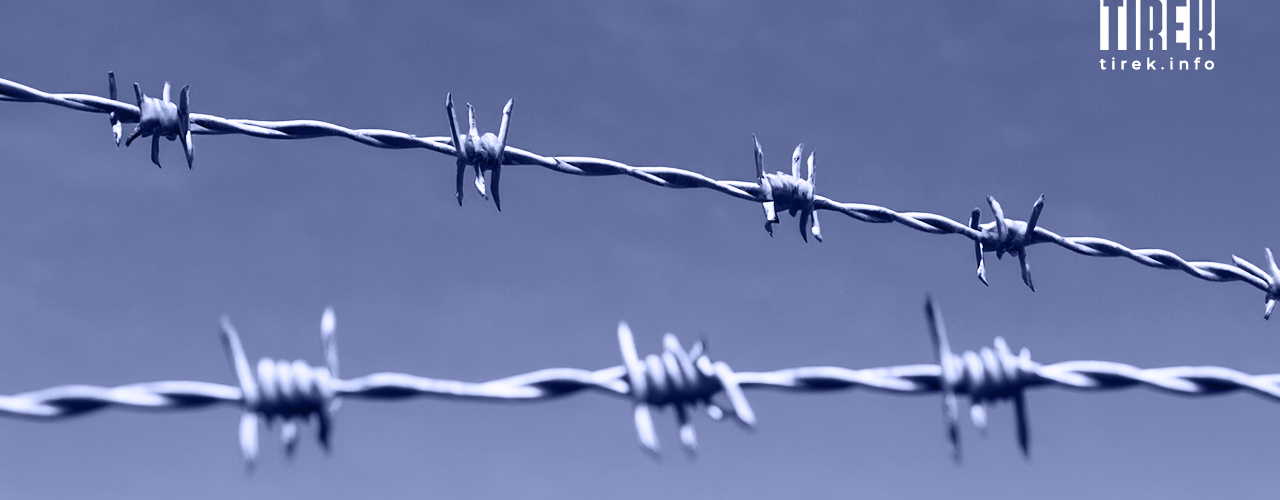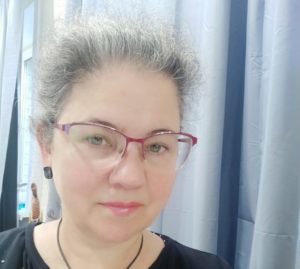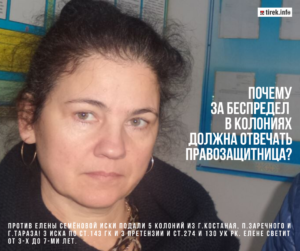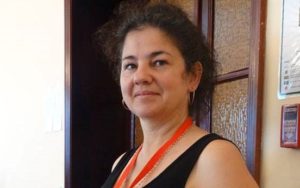AMNESTY INTERNATIONAL
Public Statement
AI Index Number: EUR 57/2771/2020
22 July, 2020
Kazakhstan: Penalized for speaking out about torture
Elena Semionova, is a human rights defender in Pavlodar, in northern Kazakhstan. She heads a local Public Monitoring Committee, a non-governmental body that monitors the situation in pre-trial detention centres, and an NGO, “We are against Torture”. In 2020, to date, she has been the subject of six civil defamation cases lodged against her by prison officials because of her work exposing alleged cases of torture in prisons.
Elena Semionova is not discouraged by the growing list of cases against her and told Amnesty International: “They think they can make me stop but in fact these trials against me have given the prisoners the chance to speak out.”
The court cases have brought the problem of torture and ill-treatment in prisons in Kazakhstan to public attention and given the alleged victims the chance to speak out when they are called as witnesses. Elena Semionova told Amnesty International that prisoners are increasingly finding the courage to speak out because they have a chance to be heard even if the court decisions are not in Elena Semionova’s favour. Elena is convinced that this publicity will force the prison service to clamp down on torture and other ill- treatment.
Elena Semionova is no stranger to this kind of harassment and over the years she has experienced verbal threats, physical violence by police officers and prison directors. She has faced defamation cases taken out against her by prison directors, and even an arson attack on her house.1 In 2015, the Penitentiary Service Committee2 issued an internal ministry instruction banning her from visiting prisons, however, she remains in contact with prisoners and their relatives and assists them in lodging official complaints.
The first case against Elena Semionova this year was lodged by the director of Prison-161/2 in Kostanay in March 2020 claiming that she had caused reputational damage to the prison staff. The prison director stated in his complaint that Elena Semionova’s posts on social media had caused “a negative public response, a false impression that the plaintiff, being a state organ, carrying out the punishment of offenders, was doing so with gross violations of the law, and thus damaged its reputation.”
In October 2019, Elena Semionova’s NGO sent a complaint to the Internal Security Department3 of the Kostanay Penitentiary Service about reported ill-treatment of a number of prisoners in Prison 161/2. The Internal Security Department replied denying all allegations and denying that any prisoners had complained. The prisoners subsequently declared a hunger strike to protest the lack of investigation of the alleged ill-treatment, and subsequently complained of inadequate medical treatment. In January 2020, many of the prisoners fell ill with stomach problems and they alleged in a complaint that they had been poisoned by prison staff.
In January, Elena Semionova described in a Facebook post the situation in various prisons at the end of 2019. She mentioned the hunger strike in Prison 161/2 that had lasted 3 days and concluded: “In all these incidents of self-harm and hunger strikes the prisoners were pushed into it by the inaction and the covering up of crimes and torture by the employees of the institutions and also by the inaction of the oversight bodies.”
During the court hearings on the case concerning Prison 161/2 held in May 2020, a large number of prisoners were questioned in order to ascertain whether Elena Semionova’s allegations were true or not. Some confirmed the information reported by Elena Semionova and others denied it. Only those that denied the allegations presented by Elena Semionova, according to Elena, were quoted in the court decision. The decision also referred to a linguistic expert engaged by the prosecution, who concluded that her statements contained “negative opinions” about the prison staff, and thus damaged the reputation of staff.
On 3 June, the judge found that Elena Semionova had defamed the prison staff and ordered her to withdraw her statements and publicly retract them. The human rights defender is intending to appeal the decision.
On 3 July, Elena Semionova lost a case against the director of Prison 164/4 in the village of Zarechny in Almatinsky region. It concerned the reported beating of a prisoner by prison guards on 10 April 2020. Despite medical reports documenting the injuries that the prisoner had sustained, the prison authorities insisted that the injuries were self-inflicted. The prisoner himself testified in court that he had been beaten and furthermore, the internal investigation report presented to the court stated that one of the guards had used Sambo combat sport4 techniques to subdue the prisoner who was allegedly behaving aggressively. Yet the court in Pavlodar concluded that Elena Semionova’s reports of the ill-treatment were untrue and harmed the reputation of the director of the prison.
There are four more defamation cases ongoing at the present time against Elena Semionova. One case is lodged by head doctor working at Prison UK-161/2 in Kostanay, and concerns the same incident of a mass hunger strike and alleged poisoning. There are further complaints from Prison 158/7 in Zhambulsky Region, Prison 158/4 in Zhamylsky Region, and from a second prison in the village of Zarechny in Almatinsky Region.
All these cases are helping to shine a spotlight on the situation in prisons in Kazakhstan. Elena Semionova was contacted by prisoners in Prison158/4 in Zhamylsky Region in May who told her that a prisoner had nailed his feet to the floorboards of his cell to protest against ill-treatment by prison staff, alleging that he had been beaten by prison guards and subsequently denied medical care following the beating. About 15 other prisoners claimed to have witnessed the events, demanding that the guards call an ambulance and notify the prosecutor. The guards reportedly made clear their intention to remove the nails from the prisoner’s feet with a crowbar. An ambulance arrived after a five-hour stand-off between guards and prisoners.
Amnesty International calls on the Kazakhstani authorities to live up to their international human rights obligations to facilitate and protect the work of human rights defenders and to eradicate torture and other ill-treatment. They must ensure that the reports of torture and other ill-treatment publicized by Elena Semionova are promptly, independently, impartially and effectively investigated.
Background
Torture and other ill-treatment is widespread in penitentiary institutions in Kazakhstan and flourishes in a culture of impunity. There is a consistent failure to carry out impartial, independent and effective investigations, and complaints are usually met with official denial. There is no independent mechanism for investigation of torture and other ill-treatment in Kazakhstan, and no plans to establish one. Torture allegations in prisons are investigated by the Internal Security Department of the Penitentiary Service Committee, or in very severe alleged cases of physical violence by investigators from the Prosecutor’s Office.
In 2019, Elena Semionova’s organization lodged 114 complaints about torture or other ill-treatment, as well as the failure to provide adequate healthcare, food and clothing and the conduct of prison staff.
Elena Semionova’s reports of the situation in Kazakhstan’s prisons are supported by the UN Committee against Torture’s own findings – its Concluding Observations to the State Report in 2014 expressed concern that “allegations of torture and ill-treatment received from persons deprived of their liberty by members of the State party’s Public Monitoring Committees and the National Preventive Mechanism are reported back to the authorities with responsibility for the place of detention rather than to an independent investigating authority, with the result that individuals who complain of torture are made vulnerable to reprisals.” The Committee also expressed concern that less than two per cent of complaints of torture received by the state bodies led to prosecutions.
Public Document
****************************************
For more information please call Amnesty International’s press office in London, UK, on +44 20 7413 5566 or email: press@amnesty.org
International Secretariat, Amnesty International, 1 Easton St., London WC1X 0DW, UK







Для отправки комментария необходимо войти на сайт.